This is part of a series where I talk about my thoughts on things I found interesting in series that I don't have enough to say about for a full analysis.
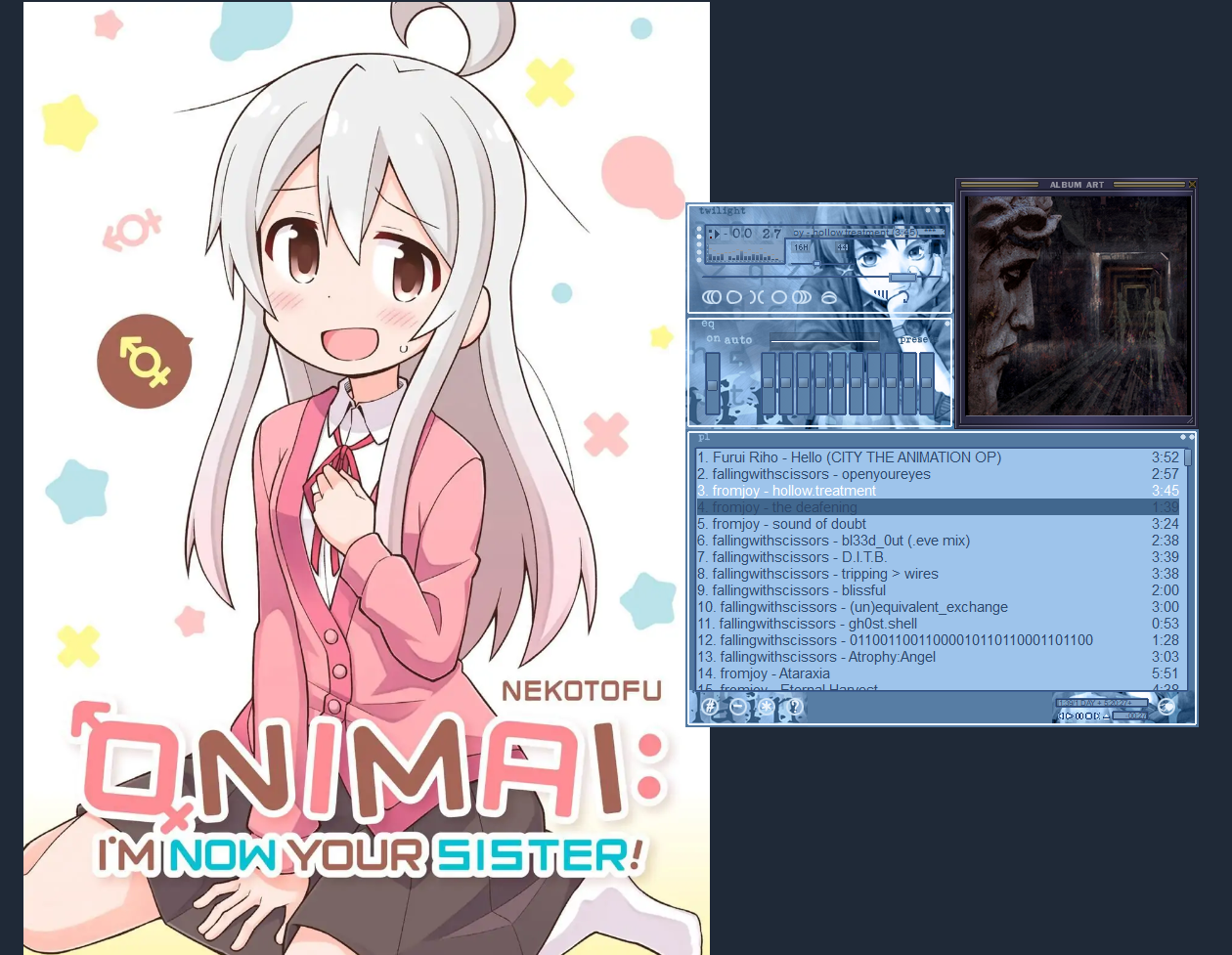
I've been meaning to get around to this one. Like a lot of trans media it's something you, or at least I, felt like it was important for me to see and form my own opinions on. Don't get me wrong. It's not that I, as le tranner, have to "have a take". The storm of "discourse" around this series didn't interest me at all before I saw it; rather, I knew if I was going to engage with Onimai, I had to do it on my own terms. Wonderfully enough it is a story largely about existing on your own terms.
I'm something of an expert in Cute Girls Doing Cute Things shows. I met my best friend Matpi through Chuunibyou Demo Koi ga Shitai and we bonded over a lot of the rest of Kyoto Animation's output like K-On, Tamako Market and the like. I watched Minami Straight on my last day of high school. It was a dark time. Getting more into the genre with shows like Shirobako and Lucky Star, and reading Gakkougurashi... as warm as they were, like torches, they also shone a light into a vast cavity in my life. It wasn't just "life as a girl", though that was a part, but "living properly," as in, having a life more than what other people saw. My own character. Existing to and for myself, not as an observer of myself but as its own self.
I formulate it something like this: Being and Doing are the two minimum requirements for existence. It's not enough to just sit there getting colder as the seconds pass. That's not even being. Think about what you were told a million times growing up: "have fun and be yourself." They don't just say that to make you feel better. Hiding your likes and dislikes from the people around you only makes everyone miserable, in the end. Humans are social creatures. Its our reflex to get along, or at least not break rank. But we're also flawed creatures. It's only so much putting on a face one can take before burning out of patience. And "compromising so much to exist in society" (to paraphrase locon's Natsu no Takenawa) takes a lot of that out of a person. There's only so much a person can stand to negotiate away before they start to turn to air on the inside. In short, if you don't, or can't, try to be you, it's a compromised existence. It's no wonder why someone like Mahiro would rather live alone than in a world that asks her to compromise just to stand.
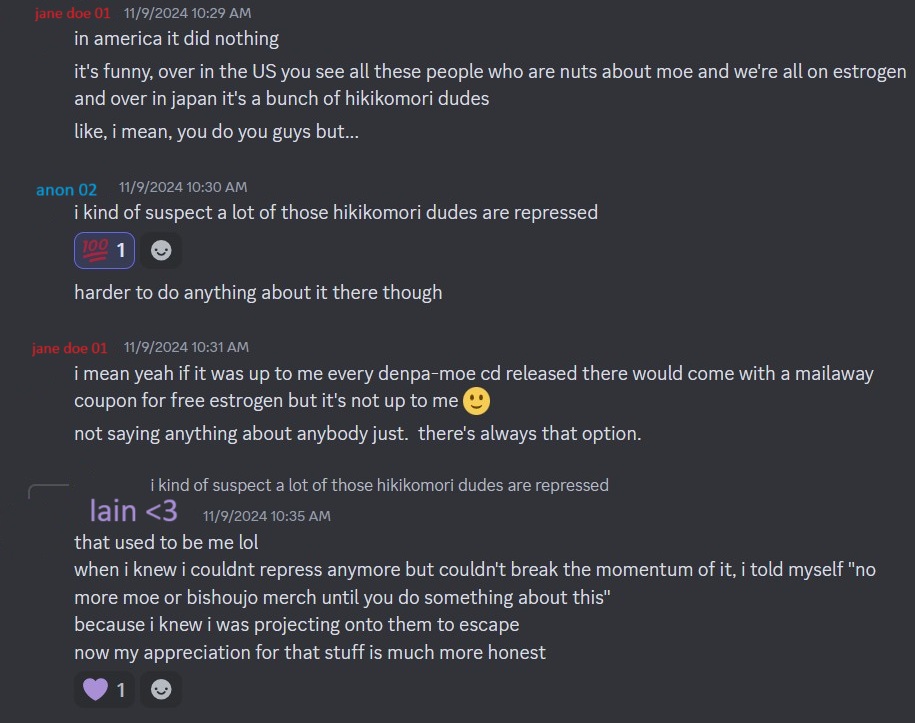
Being, then, for me, is a constant process of determining my thoughts on everything. Being in observing, and existing outside of observation. Its an unfair bargain every thing with a shape makes with the fabric of space and which everything with thoughts makes against the nature of reality. "Not all of me will ever be seen, but I will insist upon existing."
And then–Doing. That's the easy part, right ? "What would the girl I want to be do in this situation." We all ask that... right ? Maybe that one's just me. Actually, let me know if all my philosophizing here is just talking about myself. I can believe some pretty strange things in isolation. I sort of touched on it before, but I believe the nature of things to be fairly transient. Fleeting, if you will. If you don't "act like yourself" that self tends to just decay into air after "burning alive in silence" for a time. There's a hopeful side to this, too. It's probably the first interpretation of "people can change" you think of, hearing that phrase. Asking oneself that question–"who would the person I want to be do in this situation?", and then doing it... well, I'll tell you from experience it'll make you into the kind of person that you want to be.
It's hard work, piecing one's self together like that for the first time, and I like to think I did a pretty good job. I've changed a lot, but I'm still proud of my old blog posts even if I don't stand by them. Even when i got to the scary part in transitioning, I took it as a chance to expand my preconceptions about my self–about the kind of "Cute Girl Doing Cute Things" I would be. At some point I think i convinced myself that since I shouldn't have to try so hard to be me, I should try less, and that was the start of a truly miserable time in a way I'd hoped to never, ever experience again. I spent my 21st year feeling like I did when I was 15 and it was only when writing this post that i pieced together that was a part of second puberty. I'll get into it more later but given the general tone of Onimai as a gentle healing series, it sort of shocked me into being gentler with myself about that incredibly bleak time as just my own growing pains turning out how they would. If absolutely nothing else it is very dear to me for that.
Quietly, I do feel that level of–I guess philosphizing? is required to talk about even my impressions from Onimai. The wish fulfillment on display here is a lot more complex than that phrase, "wish fulfillment," implies. Its more like "void fulfillment." The wish being fulfilled is that socialization as more than a doormat, and by extension a past as more than a mirrored expression, is possible. It's a very warm series in that it seeks to fulfill a wish often entirely supressed from perception. It's proactively kind of Onimai, as a work, to seek out the purposefully hidden wounds and soothe them. That's something exceptional for a show in the iyashikei (healing-style) genre. It's also, for all its healing tone, a text about growth, both as a person from a hikkiNEET eroge addict and into new girlhood in a second puberty. That growth is slow and exhausting in a particularly relatable twist for little old atrophied me. There's a lot of talk of Mahiro's former shut-in "dearth of stamina" conflicting with her new active life. And that's not even close to the only way her past life interferes with her present at all.
Mahiro is never given a win. Even her original transformation shocks and scares her before she realizes her new life feels pretty nice, and this sets the tone for the series. The story is only wish fulfillment insofar as it is a dream of something that should have been. The actual circumstances of growing up are still tough ! But it's to an end, or at least with a purpose. The lessons learned take hold the right way; she is socialized not as a doormat, this go-round, but a girl. She's able to make it out into the world, develop more likes and dislikes on her own, and have experiences without a clear takeaway like having fun growing an ultimately bland watermelon. She makes friends with girls, as a girl, and slowly lives as one with less and less fear in each intimidating "step" (as the chapters are named.) And she still... even without the burdens of her first body, holds that tragedy in her. Quietly, she shoulders its burdens. Mahiro's constantly blunt, anxious internal monologue staves off any sense of smothering hogboxy-ness. Its painful, actually, in how much she frets over things like her gaze. "Do I look like a girl" is a question asked both by and of the observer in situations like these. But everyone around her... more than being polite not to notice, simply don't care, if they're even paying attention. Partially, that's just gag manga obliviousness, but it's also a reassurance to girls who are judged even more harshly than society's baseline. There are the right people out there who aren't gonna breathe down your neck, pick apart your mannerisms for scraps of percieved maleness.
Since apparently this is a debate, Mahiro is a trans girl. The specificity of her experience as an allegory for– no, just a different kind of "puberty 2" is a large part of what's interesting about Onimai. She has a lot of dysphoric behaviors when she's confronted with the differences in her experiences to literally every girl in her peer group. Otherwise each chapter is about a new, small happiness budding or blooming in her life. When noticing these in a character it gets to a point where I wouldn't be literate of the material if I didn't note it as at least subtext, no matter who I am. One of the first chapters has Mahiro lamenting her lackingness growing up next to Mihari before expressing a lightness at now being her younger sister, comparing it (depending on the translation) to either a fitting coat or a lifting weight. Another has her talking about always wanting to play as a girl in video games, which is more of a rectangle-square kinda situation but in conjuction with everything else is unignorable.
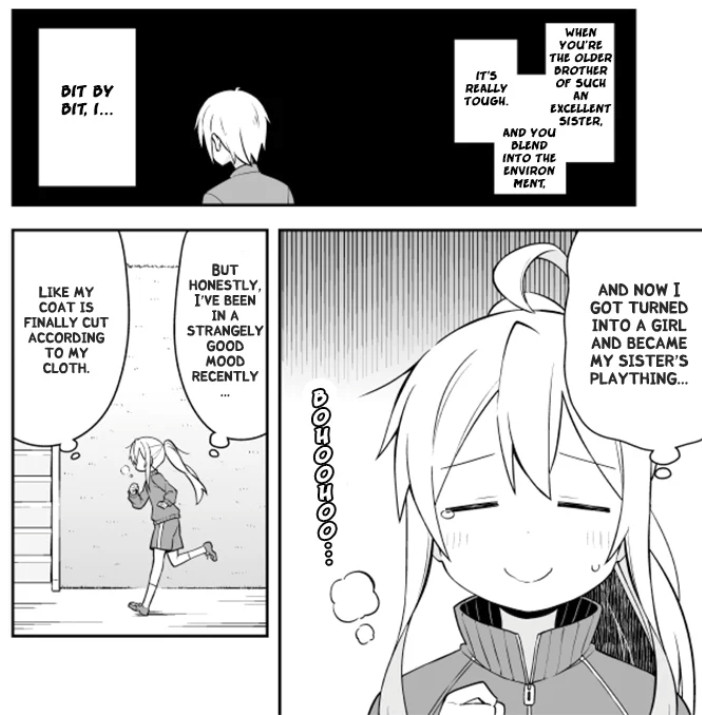
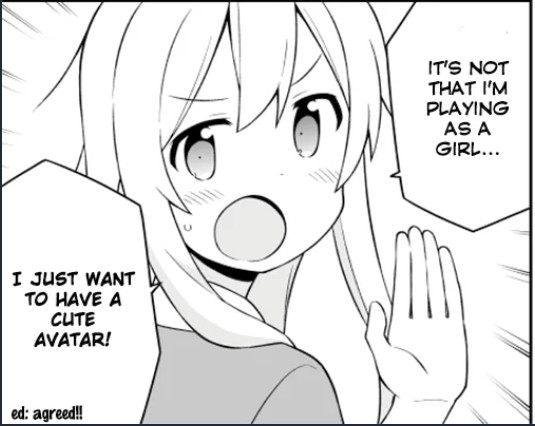
There is a crushing set of panels where Mahiro is looking at old pictures, from before she fell into her sister's shadow, and she doesn't know how to feel about having looked then like she does now. It's a deeply mournful moment to me.

There are a lot of times where Mahiro says things like this: "I don't know how to feel about that" in relation to being told feminine things suit her, like she's reflexively denying herself... and it never really arouses suspiscion. Like, Mihari's cover story is "Mahiro was sickly for a long time and is only just now getting better," and as far as that flies and as far as Mahiro is showing improvement over time with sustained doses, that's not even untrue.
And if nothing else, if Mahiro were anything but a trans girl there would be literally no reason for Mihari to specify "if a cis girl took this". If she was actually still a guy, or any other gender, she would have just said "if a girl takes this" and if she saw Mahiro's complete physical change as anything but a gender transition she wouldn't see herself as the first cis girl to take the medicine.
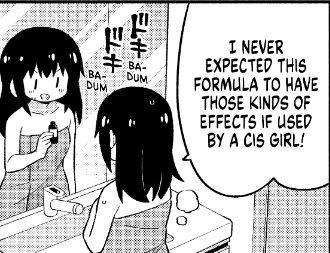
It goes all the way down to specific turns of phrase. Like with Full Metal Alchemist Brotherhood's first OP leaning on imagery of "a gust of wind feeling like something again" which invokes common descriptions of escaping a vast depression, the opening color pages to volume 5 have Mahiro riffing on her life going from "drab, gray and lifeless", to "vibrant and colorful" "ever since she became a girl." (These are direct quotes from the official translation.)

Honestly even more than the wish fulfillment aspect, or its literacy in regards to its subject matter, I think Onimai's biggest appeal to me is in its pervasive gentleness. As Mahiro experiences her second puberty and re-learns how to navigate life, properly this time, she's never truly alone. Even when left to figure things out on her own, there's a friend there for her if she really, truly can't do it. Everything is tough, but fair, which is how growing up should be and how growth happens. Crucially for me, it doesn't matter than Mahiro is living for the second time, yet learning things for the first. I'm also figuring a lot of stuff out in second puberty. I'm hormonal, emotional, unevenheaded, and it causes me problems sometimes. I make mistakes I should know better than and act immaturely when I should have grown out of that. But beating myself up for every mistake, percieved or real, doesn't do anything to prevent them in the future. It's just the opposite. The care not shown to Mahiro the shut-in stunted her. Just as Mahiro's shock->acceptance->comfort in response to her transformation sets the tone for the series, Mihari's love is such that she devoted her study to making medicine for the sake of her sister's well-being. That care and devotion is baked into the premise. It would be a betrayal of the reason for the series for it to not be.
All in all, I call Onimai "Transsexual Lucky Star" and I stand by that. For all I talk about its focus on growth and relations to philosophical underpinnings it is ultimately about a girl hanging out with her friends, having fun and telling jokes and laughing and smiling through their fleeting youth. Even more so for its themes of repeated lesson-learning and life-living, it's about making the most of that time, finding meaningful progression in each moment. As we grow, the world around us changes, and we can never truly experience it again. So to be, and do, and take it all in when you can, is the most important thing of all.
I'll leave you with a quote, my favorite one of all time and the one that made me realize the urgency of being myself:
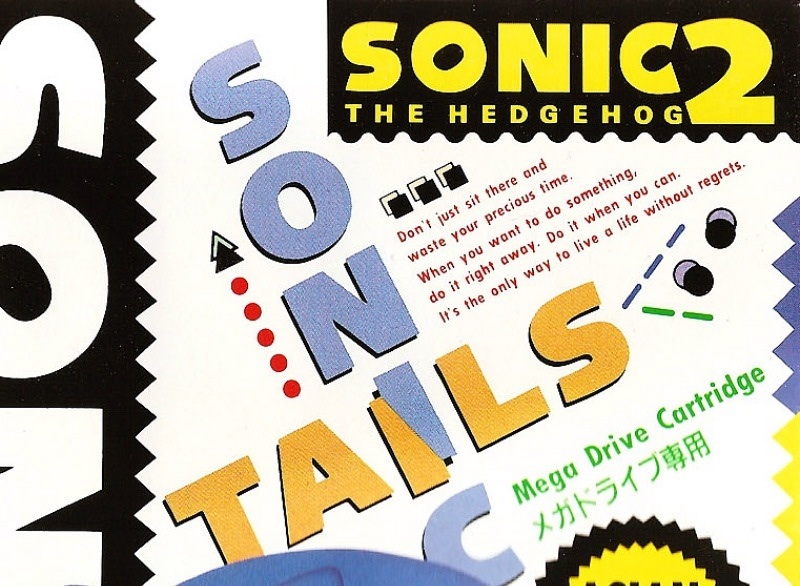
"Don't just sit there and waste your precious time. When you want to do something, do it right away. Do it when you can. It's the only way to live a life without regrets."
Thank you very much for reading ! <3